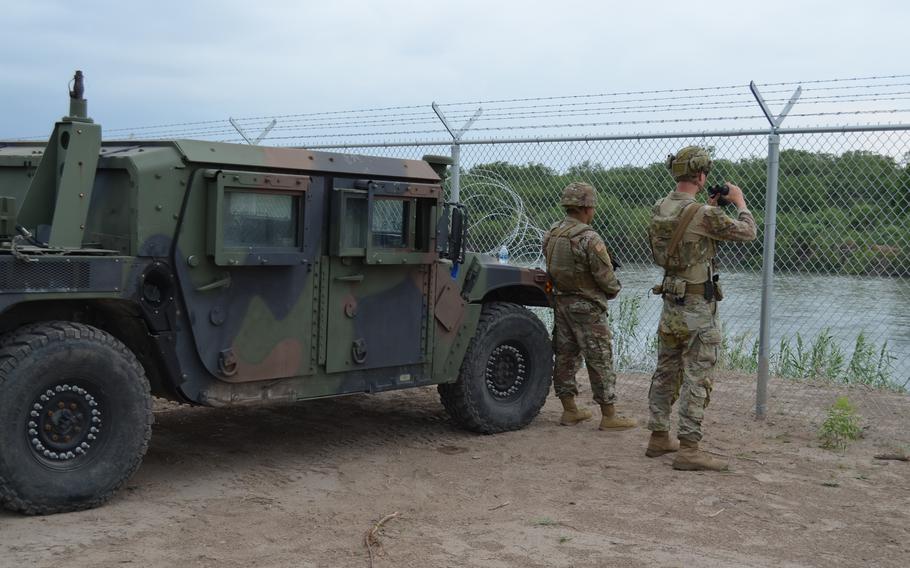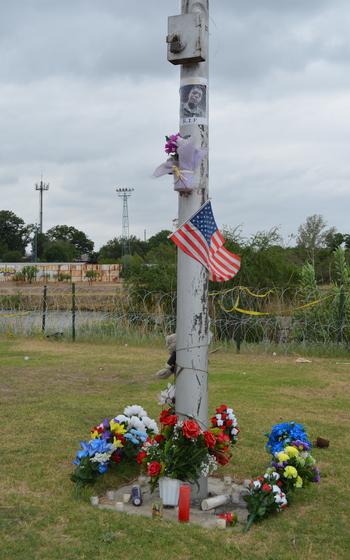
Members of the Texas National Guard on patrol May 23, 2022, in Eagle Pass, Texas. (Rose L. Thayer/Stars and Stripes)
AUSTIN, Texas — At least 17 Texas National Guard members have died while deployed on the state’s three-year-old mission to deter criminal activity at the U.S. border with Mexico, according to state military officials.
Of those, the families of four service members received the newly authorized $500,000 death benefit and six families are waiting for a determination on whether they are eligible for the money. The remaining cases were denied the benefit or the service member had no eligible relative to receive the money.
The Texas Military Department has been tightlipped about troops serving at the border, though how many troops have died in connection to the mission came out during a hearing last week of the Texas House Committee on Defense and Veterans’ Affairs. Members heard from state officials regarding implementation of a new law to provide death benefits for troops who die while on state missions.
The state passed the Bishop Evans Act into law in 2023 following the death of the 22-year-old sergeant who drowned in the Rio Grande while trying to rescue two migrants struggling in the water’s current in April 2022. The law created the access to the death benefit.
Evans was serving on the border mission, which is known as Operation Lone Star. The deployment puts Texas National Guard members alongside state police at the border with Mexico to deter illegal activity such as human smuggling and drug trafficking. It is separate from a federal mission that sends National Guard troops to support Customs and Border Protection agents along the entire southwest U.S. border.
The incidents on the border mission that led to troops dying have varied. Some of the soldier deaths reported include one who died from a medical emergency at a hotel where troops were staying in McAllen, and another who was accidentally shot in Fort Clark Springs. Two other soldiers died in a traffic accident in Laredo — one in the accident and the other by suicide in the minutes after the crash. At least four additional soldiers have died by suicide while assigned to the border.
Unlike state police officers with whom Guard members worked at the border, troops were not eligible for death benefits from Texas. Only those on a federal mission could trust their families would be compensated should they die while on assignment.
The Bishop Evans Act added Guard members on state missions to the list of state employees eligible to identify a beneficiary to receive a lump sum payment of $500,000 from the Employees Retirement System beginning Sept. 1, 2023. If the service member had minor children, they are eligible to receive monthly payments until age 18.
For those who died on Operation Lone Star before Sept. 1, 2023, the law provided $2 million to a crime victim compensation fund to support those families — describing them as victims of border crime. If the service member did not identify a beneficiary before their death, the money goes to the surviving spouse, child or parent of the deceased in that order.

A memorial on display in Shelby Park in Eagle Pass, Texas, on May 23, 2022, to honor Sgt. Bishop Evans, who died in April 2022 while trying to rescue two migrants struggling in the water nearby. (Rose L. Thayer/Stars and Stripes )
Ten families have filed claims for deaths that occurred between March 6, 2021, when Texas Gov. Greg Abbott activated the border mission, and Sept. 1, 2023, Shelia Bailey Taylor, director of state administration for the Texas Military Department, told the committee last week.
Of those, only four claims met the eligibility requirements to receive $500,000, she said. One of those claims was not paid the money because there was no authorized relative available. The other six claims did not meet the requirements for compensation under the crime victims fund, though Taylor did not specify why the claims were denied.
Seven claims have been filed for deaths that occurred after Sept. 1, 2023, she said.
“[The Texas Military Department] is responsible for the investigation of the incident and determining whether, in fact, the death was in the line of military duty. By rules, TMD’s investigation is conducted in accordance with Army regulations, which I understand, is a complex and detailed process,” Taylor said.
Only one of the seven investigations has been completed, and the family did receive the $500,000 benefit, she said.
Seven claims were also submitted for the state’s workers compensation, which has a narrower scope of approval, Taylor said. Six of the claims were denied because it was determined the service member was not “on the job” at the time of death. One remains pending.
“I’d further note that military line of duty is construed more broadly than [workers compensation], and generally in the absence of misconduct, it is considered to apply if the individual service member was actually on valid orders,” Taylor said.
Rep. Ray Lopez, D-San Antonio, who is the vice chairman of the committee, called on the military department to speak up if any concerns or gaps appear in the new law so they can be addressed.
“We know that it is a good attempt. Its intent is certainly perfect in the sense that we want to put legislation out there that is helpful to those folks who we’re serving. But we know that it isn’t,” he said.
The Guard and the governor’s office have not said recently how long the border mission will continue or how many troops are assigned to it. Troop levels peaked during the first year with roughly 10,000 Guard members deployed.
The Guard in May opened a forward operating base in the border town of Eagle Pass that can support up to 1,800 troops. Abbott said during the opening of the base that it will remain operational as long as migrants continue to cross the border illegally.
When Abbott first sent troops to the border in March 2021, the number of migrants crossing between the legal ports of entry was up following a significant drop caused by the coronavirus pandemic the previous year.
In fiscal 2022, more than 2.2 million migrants were counted by Customs and Border Protection. The following year saw a 13% drop in migrants crossing into the United States.
Border Patrol released July statistics that showed agents detained 56,400 migrants — the lowest number since September 2020. Border Patrol credited this drop to policies implemented by President Joe Biden, which included a June proclamation to suspend entry of certain migrants.
Abbott has credited the drop in border crossings to Operation Lone Star, which he said has led to the apprehension of more than 518,300 migrants and 46,000 criminal arrests. He said Texas law enforcement has also seized more than 521 million lethal doses of fentanyl.